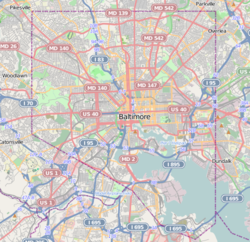Montgomery Ward Warehouse and Retail Store | |
 Montgomery Ward Warehouse and Retail Store, September 2012 | |
| Location | 1000 S. Monroe St., Baltimore, Maryland |
|---|---|
| Coordinates | 39°16′34″N76°38′41″W / 39.27611°N 76.64472°W |
| Area | 16.2 acres (6.6 ha) |
| Built | 1925 |
| Built by | Wells Bros. Construction Co. |
| Architect | McCaully, W.H. |
| Architectural style | Early Commercial, Art Deco |
| NRHP reference No. | 00001085 [1] |
| Added to NRHP | September 14, 2000 |
Montgomery Ward Warehouse and Retail Store is a historic warehouse and retail building in Baltimore, Maryland, United States. It is an eight-story (plus penthouse) concrete structure and is roughly shaped like a squared-off number "4". The front features a penthouse tower at the main entrance bay with a balcony and capped by a flagpole. The building houses over 1,200,000 square feet (110,000 m2) of floor space flooded by light from approximately 1,000 large multi-paned, steel frame windows. It was built about 1925 as a mail order and retail warehouse for Montgomery Ward on an 11 acres (4.5 ha) site adjacent to the Baltimore and Ohio Railroad tracks. [2] The complex was one of nine large warehouses built by the company in the United States. [3]
Contents
From 2001 to 2002, the vacant warehouse was restored as an office building by Himmelrich Associates, Inc. for Maryland Department of the Environment, M&T Bank and other tenants.
Montgomery Ward Warehouse and Retail Store was listed on the National Register of Historic Places in 2000. [1]





